- Home
- Charles de Lint
The Valley of Thunder
The Valley of Thunder Read online
PHILIP JOSE FARMER'S DUNGEON
BOOK 3
THE VALLEY OF THUNDER
Charles de Lint
A BYRON PREISS BOOK
BANTAM BOOKS NEW YORK · TORONTO · LONDON · SYDNEY · AUCKLAND
THE VALLEY Or THUNDER A Bantam Spectra Book / Published by arrangement with Byron Preiss Visual Publications. Inc Bantam edition / June 1989
Special thanks to Lou Aronica. Shawna McCarthy. Richard Curia. David M. Harris, and Mary Higgins.
Cover and interior art by Robert Gould Book and cover design by Alex Jay / Studio J.
THE DUNGEON is a trademark of Byron Preiss Visual Publications. Inc.
All rights reserved Copyright I989 by Byron Preiss Visual Publications, Inc. Introduction copyright 1989 by Philip Jose Parmer Cover art and interior sketches copyright I989 by Byron Preiss Visual Publications. Inc No part of this book may be reproduced of transmitted in any form or by any means, electronic or mechanical, including photocopying, recording, or by any information storage and retrieval system. without permission in writing from the publisher For information address Bantam Books
ISBN 0-55S-27958 0
Published simultaneously in the United States and Canada
Bantam Books are published by Bantam Books, a division of Bantam Doubleday Dell Publishing Croup. Inc Its trademark, consisting of the words "Bantam Books" and the portrayal of a rooster, is Registered in US Patent and Trademark Office and in other countries Marca Regutrada Bantam Books. 666 Fifth Avenue, New York. New York 10101.
PRINTED IN THE UNITED STATES OF AMERICA O 0987654321
for Philip José Farmer
because I can think of no better opportunity than my work on this project to thank him for all the years of reading pleasure that he's given me
Foreword
Nightmares...
The "nightmare" comes from the Middle English nightmare, meaning night demon. When I was young. I thought that the word derived from female horses that galloped into your sleep with eyes flashing fire, with unhorselike teeth sharp as a tiger's, with flaring nostrils spurting poisonous gases and hooves ringed with spikes. Their monstrous whinnying was echoed in my fear-filled and desperate cries for help just as I awoke.
But even the Land of Nod has its pleasant beings, and these were the enjoyable dreams. Though I always awoke during a nightmare. I sometimes also awoke after the "good" dreams. Whether they were enjoyable or terrifying, if they were easily analyzable, I would go back to sleep soon. It the nightmares were not transparently understandable—nightmares and dreams are nocturnal semaphores—I would spend some time trying to probe their origins before going back to sleep. Most of the time, I was too tired to spend much effort on them, but would remind myself to think about them during the daytime.
Dreams and nightmares are many, but I think I've had at least one that I could remember in each week of my life. Of course. I've forgotten many of these. But. counting the period when I was an infant, at least three thousand six hundred forty dreams, interspersed with nightmares, have spurted out of my unconscious. I only logged a few. and only the most striking can be summoned up from that wild data file called the memory.
Dreams/nightmares have inspired me to write stories. One, for instance, was a short tale titled, "Sail On! Sail On!" This is about Columbus's first (and last) voyage in an alternate universe. In this, Earth is both flat and the center of the universe. And Roger Bacon, the thirteenth-century English Franciscan and proponent of experimental science, has not been persecuted by the Church as he was in our universe. Instead, he founded the Baconian order of monks. Thus, when Columbus sets out on the Atlantic to look for a new route to the Orient, his flagship has a radio shack on its poop deck and inside it is a friar operating a simple spark-gap radio.
This story was derived from a dream in which I saw a galleon sent out by Prince Henry the Navigator, of Portugal. The galleon had a shack and a friar as described above. His messages were in Latin.
The transition from the dream-Prince Henry to the otherworld Columbus was done, of course, by my conscious mind.
But the dream that inspired the short story, "The Sliced-Crosswise-Only-On-Tuesday-World." seems to have no rational connection with the story I developed from it. In the dream, I wandered through a tropical jungle (many of my dreams take place there) and came out into a clearing. This was occupied by bamboo and grass huts, in the doorways of which stood natives. Their skins were chalk white, and they had large dark rings of fatigue around their eyes. They were motionless, their faces were rigid, and their eyes seemed dead.
I've never figured out just how I went from that dream to the concept of the short story and the resulting Dayworld trilogy. But that came to me the next day as I was going over the dream.
In any event, I have, like some people, had serial dreams, or perhaps I should say a dream series. The adventures started in the first dream were continued in another dream, and then on to three to five dreams. There was no pattern in the time gap between the dreams. Sometimes, the sequel occurred the next day; sometimes, a week or even two weeks later. Unfortunately, I never completed any of the series. I was like the kid who watched Saturday afternoon serials in the movie theaters of my younger days and then was prevented from seeing the final chapter. I was frustrated.
Two stick in my memory, and I may use them as the bases for stories someday. One serial dream was about a band of Vikings who had invaded the underground kingdom of dwarfs or trolls to grab the gold of these subterranean beings. (The dwarf king had some resemblance to the Gnome King of Oz. In Baum's books, not in the second Oz movie.) The Vikings had to fight their way in and out and run a gauntlet of ingenious traps.
The other dream was really fever-inspired. I was in high school when I got one of those diseases so common in the 1930s. I don't remember what it was. But I was lying in bed and hot with fever, half out of my head. The Shadow, a.k.a. Lamont Cranston, was somehow in another world and was being pursued through a jungle by a large band of beings who seemed only partly human. He was not armed with his usual pair of .45 automatic handguns. He had only a bow and a quiverful of arrows. Finally, after shooting many of his hunters, he took refuge in a cave halfway up the face of a mountain. The enemy toiled up the steep slope. Thwang! Thwang! At least six of them were struck. Six enemies of The Shadow, a vicar of The Good, bit the hard rock and tumbled down into the poisonous green jungle below.
The above took place as a serial within three days. I don't remember how many episodes there were, but there must have been at least six or seven. Their rapidity in occurring was doubtless inspired by the fever.
The above leads into the Dungeon series and volume III, the book at hand. The Valley of Thunder. This title is evocative of the spirit of my writings. As I said in previous forewords, this series springs from the spirit, or one of the spirits, of my fiction. It does not derive from, nor is it a spinoff of, any specific story of mine. It embodies the Geist, the Psyche, incorporated in my fantasy and science fiction adventure tales. Thus, it is a nightmare. And, at times, it certainly seems fever-inspired.
But, unlike the nightmares I've had, its mysteries, and there are many, will eventually be explained. Also unlike my terrifying dreams, it will have a satisfactory and definitive conclusion. No cliff-hangings in the sixth and final book of the Dungeon series. Richard Lupoff, who wrote volume I. will write volume VI. He will come up with the answers and rousing climax. I am sure of that, though I have no more idea than you of how the series will end.
At the moment our hero, Clive Folliot, and his grab-bag companions are fighting in another universe for survival. They hope they will be able to solve the mystery of the forces behind this sinister world. They are hallway through their ordeal (though
they do not know this), and it seems that things cannot get worse. But they do.
In this respect, the Dungeon world resembles our Earth. We Terrestrials really do not know why we were born on this planet, or who made it, or toward what goal, if any, we are struggling. We have many theories (religions and philosophies) to explain the whys and hows and toward-whats. None is truly illuminating or truly satisfying. Not, at least, to many people. It's all opinion, without any facts to back up the opinions. Even those who reject the religions and philosophies do so on the basis of opinion, which derives from the personal set of mind and the conditioning of the individual.
Opinions are just so many firecrackers. They make a light and a noise in the darkness and then are gone. However, every day on Earth is the Fourth of July of opinions, and the unceasing supply of firecrackers makes a lot of light and noise on this world.
Firecrackers are real. Opinions are real. All thoughts are real, however momentary they may be. And fiction is as real as Reality. Fiction is part of Reality.
No one can successfully deny that fiction is just as real and as event-causing as politics and religion and hemorrhoids and headaches and stubbing your toe and slamming your car into a telephone pole. Fiction exists, and the thoughts and emotional reactions you have while reading it have an effect on you. It varies according to the story and the individual reader's reactions. Some of us are powerfully affected by a certain story, and it sticks like glue in us.
The effects are the results of electrochemical impulses, which are reactions to the fiction we read. These impulses are real because they do exist, and they bring into existence permanent things such as books, movies, buildings, paintings, music—all artifacts, in fact, and institutions and mores and changes in mores.
The thoughts you have while reading this scries may result in something as real and hard as an Easier Island stone face.
The thoughts and speech of Bronze Age and Early Iron Age people were evanescent. But they made weapons and tools and buildings because of these thoughts and conversations. Some of these survive. They also, in Greece, resulted in the eventual writing down of Homer's The Iliad and The Odyssey. These have had a great impact. I know they did on me. They have influenced my writing more than my reading of pulp-magazine stories, though I am not disparaging their effect. As a result, my being influenced by Homer has influenced others, and they write stories which, you might say, come thousandth-hand from Homer. Who got his stuff through centuries of sieving from many others.
Then there is the Bible. I read much of that when I was a child and a juvenile, and still read it now and then. That had a powerful impact on me. yet it originally was born from a series of electrochemical impulses in the minds of a series of men of the Bronze and Iron Ages. Finally, it became "real." a book. It, though partly fiction, has been tremendously influential for both good and evil. I am a student of history and biography, and deduce from these that the Bible has been, on the whole, used more for evil than good. But then, everything has its potentiality for evil or for good. Almost everything. I hasten to say. Dante's Inferno derives from the Bible and his own hatred of certain people. It has not, I believe, influenced anybody in the religious sense, but it certainly has made concrete the vision of Hell. This vision has stirred electrochemical impulses in the brains of many, chiefly preachers and writers. Many, many sermons and much written fiction have resulted from this. In several senses, the Dungeon series owes some of its geography and population to Dante.
In a previous foreword. I likened the Dungeon world to Hell. The main difference between these two worlds, however, is very significant. In Dante. Hell was the be-all and end-all for its citizens. They will suffer forever, and their characters will not change for better or worse. In the Dungeon world, despite all its horrors, optimism flames brightly. Our hero and his colleagues will suffer, but their characters may change for the better.
In this respect (and, of course, in many others), the Dungeon world resembles my Riverworld. And our own Earth.
—Philip José Farmer
One
The world was a flare of azure, riddled with sparks.
When Major Clive Folliot's party entered the gateway, the ground fell away underfoot as though it had never existed. A rushing sound filled their ears. Nausea struck, brought on by vertigo, but there was no sensation of falling. They simply floated in a limbo of blue, all the world a cloudless sky, so bright to view it hurt the eye. Every blink of an eyelid set up a new scattering of sparks and woke tears that burned the retina, momentarily clearing the vision until the blue glare struck again.
Have we died? Clive wondered.
His limbs flailed helplessly through the blue that felt too dense to be air. Breathing was a labored process. His stomach was in his throat. Shafts of neuralgic pain lanced through his head with each blink of his eyes.
Have we come so far only to die?
For this void seemed very much like death. Were Chambers and Darwin and those other atheist evolutionists correct? We came from nothing, climbing some damned evolutionary ladder, and we return to nothing. No God. No Heaven. Though perhaps this was Hell. Not fire and brimstone, nor the Purgatory that they had so recently quit on the last level, but a limbo of blue so painful it would drive a man insane.
Clive's hands clenched into fists, nails biting into his palms, knuckles whitening with the pressure.
Damn you, Neville. From the moment we shared the world I've been cursed to walk in your shadow. Must I now die in that same shadow?
The other members of his party were merely dark blots in his vision. He cried out to them, but the thick air wouldn't carry his voice. It rasped its way down his throat, leeching all moisture from its drying membrane. His chest ached, lungs hyperventilating as they tried to draw in sufficient oxygen, but succeeding only in creating an abnormal loss of carbon dioxide in his blood.
His vision began to cloud—not from the pain of the azure glare, but through lack of that simple substance upon which all men depend to survive.
Air.
Like a dark cloud, unconsciousness came roiling across the horizons of his pain. The glare was almost gone—pinprick sparks sprayed at the edge of the darkness.
So this is death. Clive thought.
It was not so bad. He could almost welcome the comfort it offered from the pain. It would be so easy to simply let go, to put away the responsibilities he had taken upon himself, to leave off the struggle, to let others beat their heads against the endless walls of the bloody Dungeon while he simply let go....
But that wasn't his way.
Though he had to work harder than his twin at whatever he undertook, he wasn't one to quit, no matter what the odds against him were.
Not even if you were offered your heart's desire?
Clive frowned at the unfamiliar voice that interrupted his reverie—
And realized that the blue was gone.
He stood in a place devoid of color or light. He could breathe once more. There was a firm surface underfoot. A light breeze touched his cheek, tickling the hairs of his mustache. A faint scent of cloves was in the air. On his tongue lay the sharp bite of anise.
"Who spoke?" he asked.
He turned slowly, careful of his footing. Under his boots the floor was as smooth as polished marble.
The voice, he realized, had not spoken aloud. Rather, it had sounded only in his mind—a telepathic communication such as Shriek utilized. But it hadn't been Shriek's voice.
There came a whispering sound—like that of a curtain being lowered.
"Who's there?" he cried. "Where are you?"
To his right, he saw a lightening of the darkness. Where all around him was the black of a sealed tomb, there the air grayed with promise. The scent of cloves faded. The sharp taste remained in his mouth, though it too was lessening with each passing moment.
He took a step toward the grayness. Another.
Like the last gateway, the air was thick here, but he could navigate through it. It was
like walking through a thin gauze, the darkness clinging to his face like cobwebs, but he made his way through it, brushing at the dark with his hands until he came at last to the gray area.
At first, he could see nothing through its wash of fog. He put a hand out and touched a membranous wall that gave outward as he pressed against it. The fog began to clear, and Clive's eyes widened with astonishment.
He was looking into a very familiar apartment. Briefly, the voice he had heard earlier echoed again in his mind.
Your heart's desire.
The room he looked into was lit by an oil lamp. Standing at the window, overlooking Plantagenet Court, was a woman. The lamplight cast her in shadow, but not so much that Clive couldn't recognize the slope of her shoulders, the coils of her hair, the neat trimness of her figure.
Your heart's desire.
By all that was holy. Somehow, he had been given a window into the London quarters of his lover, Annabella Leighton. The leagues separating London from Africa, or from wherever this damnable Dungeon lay, had been set aside to gain him this momentary view.
He called out to her, but she made no response.
He pushed harder at the membrane that held him back. It stretched, but would not give way.
He cursed the Dungeonmasters for giving him this much—but no more—and pushed harder.
One moment his hand was filmed by the pressure of the invisible barrier holding him back, then it gave through. He stepped eagerly forward, pushing his face and chest against its clinging surface, tugging at it with his other hand. Slowly—so slowly—the wall gave way.
And he was inside.
He stood, disbelieving, in Annabella's room. Looking back, he could see no sign of where he'd entered. When he studied the room, it appeared no different from how it had been the night he'd taken his leave of her—too many months ago. It was as though all his time in the Dungeon had never been.

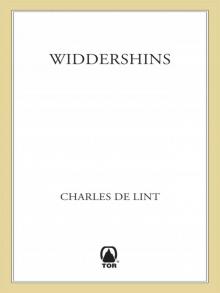 Widdershins
Widdershins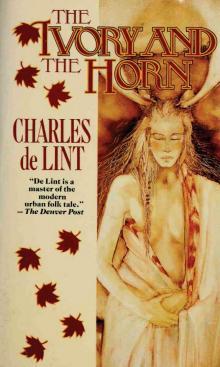 The Ivory and the Horn
The Ivory and the Horn Yarrow
Yarrow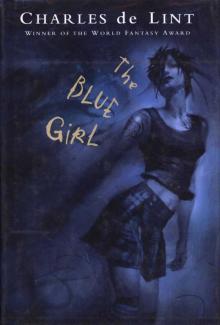 The Blue Girl
The Blue Girl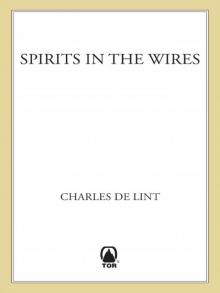 Spirits in the Wires
Spirits in the Wires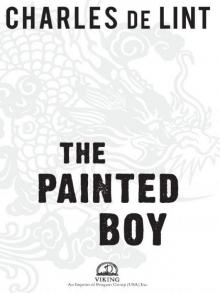 The Painted Boy
The Painted Boy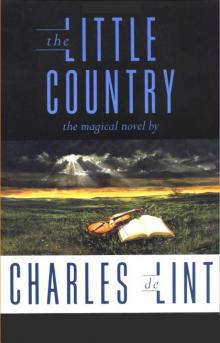 The Little Country
The Little Country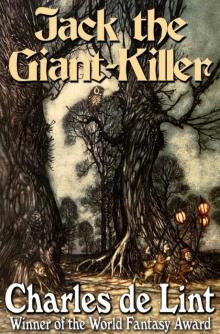 Jack of Kinrowan: Jack the Giant-Killer / Drink Down the Moon
Jack of Kinrowan: Jack the Giant-Killer / Drink Down the Moon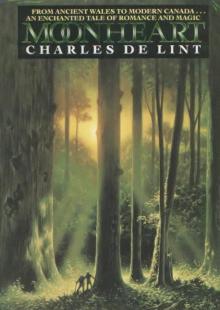 Moonheart
Moonheart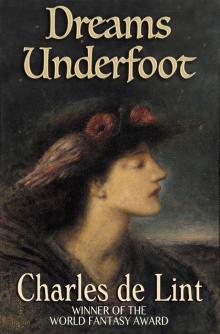 Dreams Underfoot
Dreams Underfoot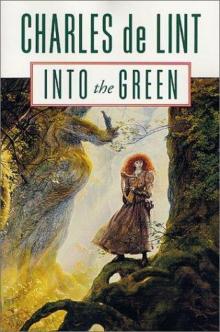 Into the Green
Into the Green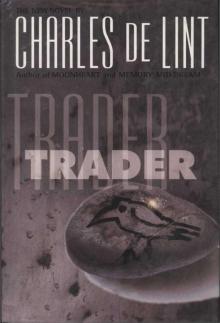 Trader
Trader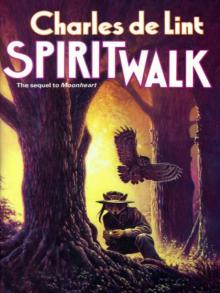 Spiritwalk
Spiritwalk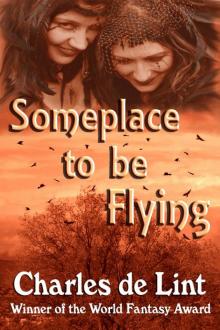 Someplace to Be Flying
Someplace to Be Flying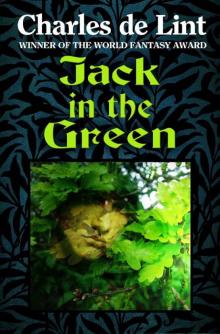 Jack in the Green
Jack in the Green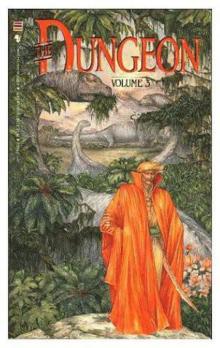 The Valley of Thunder
The Valley of Thunder Out of This World
Out of This World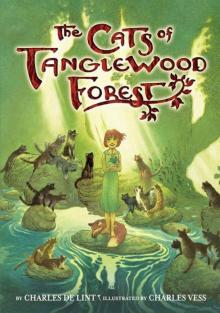 The Cats of Tanglewood Forest
The Cats of Tanglewood Forest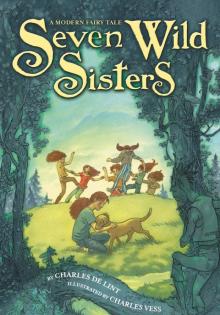 Seven Wild Sisters
Seven Wild Sisters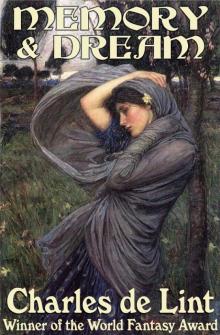 Memory and Dream
Memory and Dream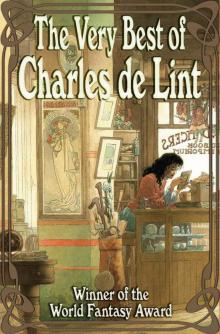 The Very Best of Charles De Lint
The Very Best of Charles De Lint Under My Skin
Under My Skin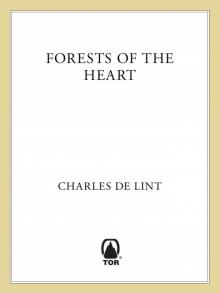 Forests of the Heart
Forests of the Heart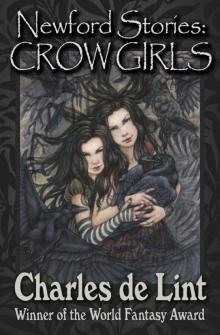 The Newford Stories
The Newford Stories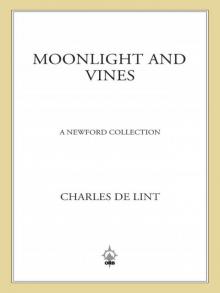 Moonlight and Vines
Moonlight and Vines Angel of Darkness
Angel of Darkness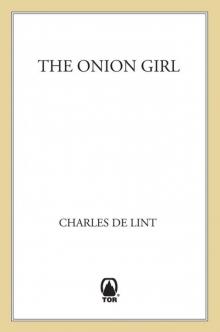 The Onion Girl
The Onion Girl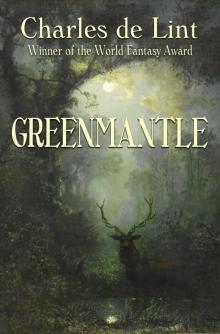 Greenmantle
Greenmantle Waifs And Strays
Waifs And Strays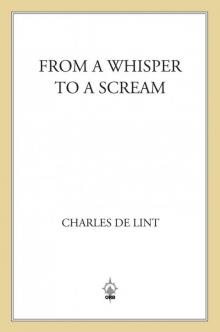 From a Whisper to a Scream
From a Whisper to a Scream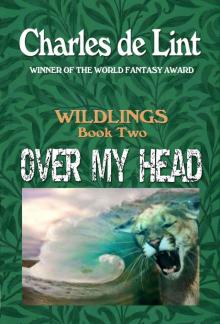 Over My Head
Over My Head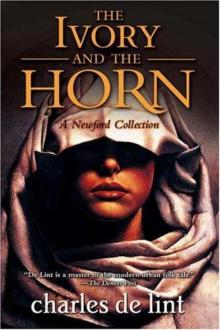 The Ivory and the Horn n-6
The Ivory and the Horn n-6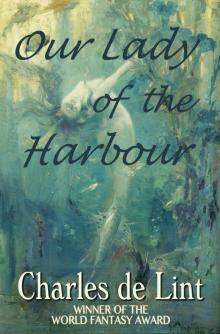 Our Lady of the Harbour
Our Lady of the Harbour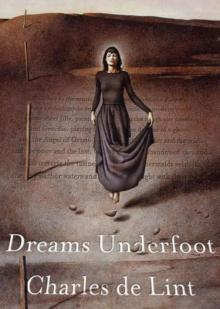 Dreams Underfoot n-1
Dreams Underfoot n-1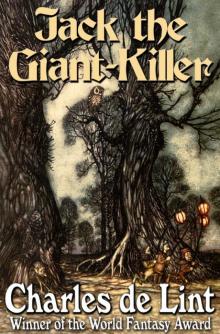 Jack the Giant-Killer (Jack of Kinrowan Book 1)
Jack the Giant-Killer (Jack of Kinrowan Book 1)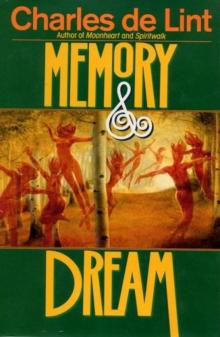 Memory and Dream n-5
Memory and Dream n-5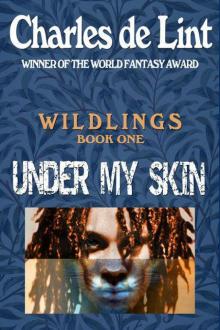 Under My Skin (Wildlings)
Under My Skin (Wildlings)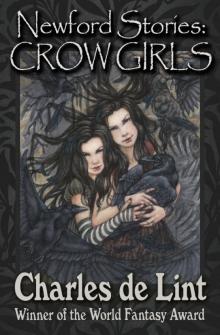 Newford Stories
Newford Stories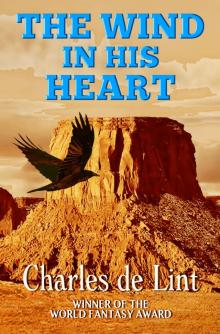 The Wind in His Heart
The Wind in His Heart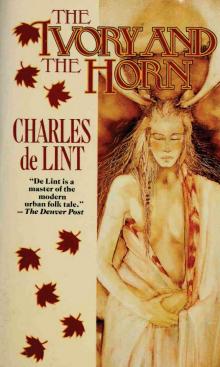 Ivory and the Horn
Ivory and the Horn